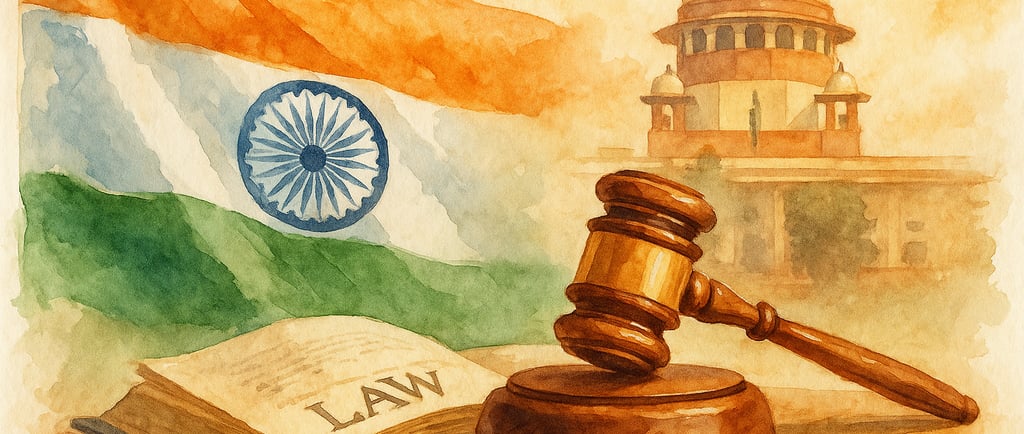🇮🇳 10 Key Sections of the Bharatiya Nyaya Sanhita (BNS) 2023 Every Indian Should Know
Explore the 10 most important sections of the Bharatiya Nyaya Sanhita (BNS) 2023 that every Indian should know. From mob lynching to organized crime, understand how India’s new criminal law is modernizing justice and protecting citizen rights.
HUMAN RIGHTS
DEV TRIVEDI
4/18/20252 min read


India's criminal justice system has undergone a significant transformation with the introduction of the Bharatiya Nyaya Sanhita (BNS) 2023, replacing the colonial-era Indian Penal Code (IPC) of 1860. The BNS aims to modernize the legal framework, making it more aligned with contemporary societal needs. Here are ten crucial sections of the BNS that every Indian citizen should be familiar with:
1. Section 101: Murder (Earlier IPC Section 302)
This section addresses the offense of murder, maintaining provisions similar to the IPC but with updated procedural aspects to expedite investigations and trials.
Punishment: Death penalty or life imprisonment along with a fine.
2. Section 152: Acts Endangering Sovereignty, Unity, and Integrity of India
Replacing the repealed sedition law (IPC Section 124A), this section criminalizes acts that threaten the nation's sovereignty and unity, ensuring a balance between national security and freedom of expression.
3. Section 113: Gang Rape (Earlier IPC Section 376D)
This section imposes stricter punishments for gang rape offenses, especially involving minors, and mandates the use of forensic evidence to strengthen the judicial process.
Punishment: Minimum of 20 years to life imprisonment or death penalty.
4. Section 73: Mob Lynching (New addition —no direct IPC equivalent)
For the first time, mob lynching is explicitly recognized as a criminal offense, addressing group violence based on identity factors such as religion or caste.
Punishment: Life imprisonment or death penalty for groups of five or more individuals involved in such acts.
5. Section 85: Dowry Death (Earlier IPC Section 304B)
This section continues to address dowry-related deaths, holding the husband or in-laws accountable if a woman dies under suspicious circumstances within seven years of marriage due to dowry harassment.
6. Section 64: Snatching (New addition — previously covered under IPC Section 379 for theft)
Introducing a new offense, this section specifically targets snatching incidents, such as mobile phone or chain snatching, distinguishing them from general theft.
Punishment: Imprisonment ranging from 3 to 10 years, depending on the severity.
7. Section 304: Hit and Run Cases (Earlier IPC Section 304A with updated penalties under BNS)
This section deals with hit-and-run incidents, imposing stringent penalties on drivers who cause death and flee the scene without reporting.
Punishment: Up to 10 years of imprisonment along with a fine.
8. Section 111: Organized Crime (New addition — earlier dealt with under various IPC provisions and special laws like MCOCA)
Addressing the growing concern of organized criminal activities, this section criminalizes offenses committed by organized crime syndicates, including cybercrime, extortion, and trafficking.
9. Section 176: Terrorist Acts (Earlier covered under special laws like UAPA; no direct IPC equivalent)
This section defines and penalizes terrorist acts, aiming to enhance national security by addressing modern forms of terrorism and associated activities.
10. Section 250: Community Service as Punishment (New reform — no direct IPC equivalent)
Introducing a reformative approach, this section allows for community service as a form of punishment for minor offenses, focusing on rehabilitation over retribution.
📝 Conclusion
The Bharatiya Nyaya Sanhita (BNS) 2023 marks a progressive shift in India's legal landscape, emphasizing justice, efficiency, and alignment with contemporary societal values. Staying informed about these key sections empowers citizens to understand their rights and responsibilities under the new legal framework.
LEGAL SPHERE Ltd © 2025
LEGAL SPHERE empowers individuals with knowledge and access to justice. We strive to protect rights, ensure fairness, and build a future rooted in legal integrity.
Reframe your inbox
Write your message below and stay connected with us!
We care about your data in our privacy policy.
